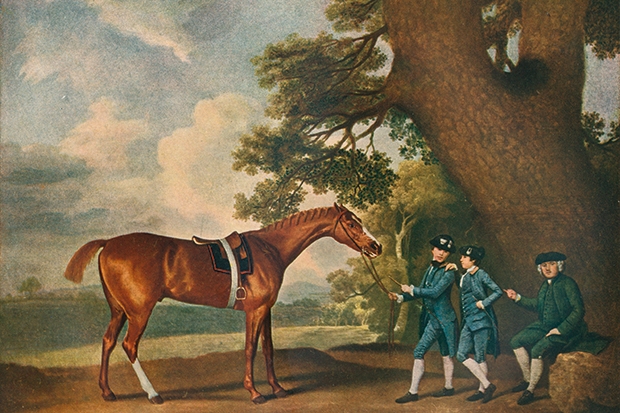Queen Victoria disapproved heartily of the racing set and of her son Bertie’s involvement in the sport. But she must have noted a dinner conversation with Bismarck reported to her by Disraeli. The German Chancellor had asked if racing was still encouraged in England. Never more so, said Disraeli, to which Bismarck responded:
There will never be socialism in England. You are safe so long as the people are devoted to racing. Here a gentleman cannot ride down the street without 20 persons saying to each other, ’Why has that fellow a horse and I have not one?’ In England the more horses a nobleman has, the more popular he is.
The Queen despaired of the future Edward VII as he ruled London society, eating, drinking and gambling, as well as bedding other men’s wives and a series of mistresses. She implored him regularly to turn his back on sporting tearaways. One day at Ascot, after Bertie’s involvement in a libel suit following an illegal baccarat game in which he had been banker, there were catcalls when he arrived at the racecourse. The growing middle class took exception to his philandering. And it was typical of his chosen priorities that when, as heir to an imperial throne, and uncle to both the Tsar and the Kaiser, he was invited to the opening of the Kiel Canal linking the Baltic and North Sea, he asked for the ceremony to be postponed because it clashed with Royal Ascot.
Christopher McGrath argues convincingly, however, that, over time, Bertie’s racing career established a public confidence in his credentials as a future king, charting progress to the point where ‘his race-horses were no longer mere agents of rebellion: they had opened an artery of public affection long clotted by his mother’. In his lowbrow imperfections his future subjects came to find the warmth and humanity they had missed in Queen Victoria.
If racing boosted Bertie’s popularity, then he returned the service. Leopold Rothschild argued that Bertie did ‘much to remove the impression that racing cannot be conducted in a healthy manner in the spirit of pure sport’. On Bertie’s death the Sporting Life noted:
Within living memory the term ‘a racing man’ was practically synonymous with that of ‘vagabond’ in the minds of the middle classes; and it is largely due to the late King Edward that the idea that the racecourse is nothing more nor less than a sink of iniquity has been removed from the minds of all but a few irreconcilables.
There is no shortage of vagabonds in a rich vein of anecdotage across three centuries in Mr Darley’s Arabian — vagabonds who include much of the aristocracy and a sprinkling of prime ministers. A trainer wins a court case prosecuting his jockey for not losing a race as he had instructed. A duellist steps back after his opponent arrives with a coffin bearing his name plate. Aristocrats paid ten guineas for portraits of their wives, and 50 for portraits of their horses.
McGrath’s theme derives from the fact that anywhere in the world, from the Melbourne Cup to the Kentucky Derby, 19 out of any 20 competitors are linked in ‘male tail’ ancestry to the Darley Arabian, perilously imported to Yorkshire from the Syrian desert in 1704. But in ingeniously threading the stories of 23 other horses in the chain from from the Darley Arabian to Frankel, McGrath has produced a racing book like no other — a book of remarkable scope.
For the horseman the racing careers of great horses like Eclipse, the curiously named Pot8os, Nearco and Northern Dancer are there. So are the hideous training methods used in the past, the six- or eight-mile hamster-wheel workouts in rugs and blankets, followed by more trussing and sweating back in the stables, the deliberate dehydration, the half-gallon weekly bloodletting, the savagery used to break a horse’s will until at last English handlers took a lesson from the Arabs and began to win co-operation from their charges with gentleness. Here, too, are stories like those of Tod Sloan, the cocky American jockey whose ‘monkey-on-the-stick’ riding style up the horse’s neck revolutionised racing in Britain.
But McGrath’s book will be read by a much wider public for its lively social history. Every age has had its symbols of luxury with which the successful or the lucky like to parade their wealth. Today perhaps it is yachts or football clubs. Owning a stable of good horses, like the regimental commissions or seats in Parliament which also could be bought, was often a chosen step on the way to a position in society or public popularity. One era was dominated by the great landowners, until the repeal of the Corn Laws in 1846. Next, studs and stables were bought by coal and steel industrial barons like Glasgow’s James Merry. As McGrath writes:
Finally, after the first world war, a global market economy divided its rewards between professional breeders and the international plutocrats who could afford to buy into their expertise.
Hence Coolmore and Frankel’s owner, Prince Khalid Abdullah of Saudi Arabia.






Comments